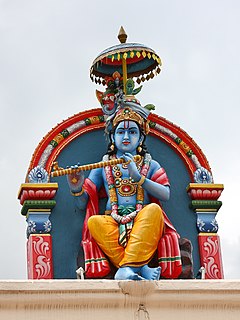Jainism, traditionally known as Jain Dharma, is an ancient Indian religion and a major world religious group. It traces its spiritual ideas and history through a succession of twenty-four leaders or Tirthankaras, with the first in the current time cycle being Rishabhanatha, whom the tradition holds to have lived millions of years ago; the twenty-third tirthankara Parshvanatha, whom historians date to 9th century BCE; and the twenty-fourth tirthankara, Mahavira around 600 BCE. Jainism is considered to be an eternal dharma with the tirthankaras guiding every time cycle of the cosmology.

Mohandas Karamchand Gandhi was an Indian lawyer, anti-colonial nationalist, and political ethicist who employed nonviolent resistance to lead the successful campaign for India's independence from British rule and in turn inspired movements for civil rights and freedom across the world. The honorific Mahātmā, first applied to him in 1914 in South Africa, is now used throughout the world.

Sikhism or Sikhi is a Dharmic religion that originated in the Punjab region of the Indian subcontinent around the end of the 15th century CE. Sikhism is one of the youngest of the major religions and the world's fifth-largest organized religion, with about 25-30 million Sikhs as of the early-21st century. However, according to rough estimates, there are around 120–150 million Sahajdhari or non-khalsa Nanakpanthi sikhs across the world who also believe in 10 Sikh Gurus and Guru Granth Sahib.

Shiva, also known as Mahadeva, is one of the principal deities of Hinduism. He is the Supreme Being in Shaivism, one of the major traditions within Hinduism.

The ZX81 is a home computer that was produced by Sinclair Research and manufactured in Dundee, Scotland, by Timex Corporation. It was launched in the United Kingdom in March 1981 as the successor to Sinclair's ZX80 and designed to be a low-cost introduction to home computing for the general public. It was hugely successful; more than 1.5 million units were sold. In the United States it was initially sold as the ZX-81 under licence by Timex. Timex later produced its own versions of the ZX81: the Timex Sinclair 1000 and Timex Sinclair 1500. Unauthorized ZX81 clones were produced in several countries.

Krishna is a major deity in Hinduism. He is worshipped as the eighth avatar of Vishnu and also as the supreme God in his own right. He is the god of protection, compassion, tenderness, and love and is one of the most popular and widely revered among Indian divinities. Krishna's birthday is celebrated every year by Hindus on Krishna Janmashtami according to the lunisolar Hindu calendar, which falls in late August or early September of the Gregorian calendar.

Swami Vivekananda, born Narendranath Datta, was an Indian Hindu monk. He was a chief disciple of the 19th-century Indian mystic Ramakrishna. He was a key figure in the introduction of the Indian philosophies of Vedanta and Yoga to the Western world, and is credited with raising interfaith awareness, bringing Hinduism to the status of a major world religion during the late 19th century. He was a major force in the contemporary Hindu reform movements in India, and contributed to the concept of nationalism in colonial India. Vivekananda founded the Ramakrishna Math and the Ramakrishna Mission. He is perhaps best known for his speech which began with the words "Sisters and brothers of America ...," in which he introduced Hinduism at the Parliament of the World's Religions in Chicago in 1893.

Sikkim is a state in northeastern India. It borders the Tibet Autonomous Region of China in the north and northeast, Bhutan in the east, Nepal in the west, and West Bengal in the south. Sikkim is also close to India's Siliguri Corridor near Bangladesh. Sikkim is the least populous and second smallest among the Indian states. A part of the Eastern Himalaya, Sikkim is notable for its biodiversity, including alpine and subtropical climates, as well as being a host to Kangchenjunga, the highest peak in India and third highest on Earth. Sikkim's capital and largest city is Gangtok. Almost 35% of the state is covered by the Khangchendzonga National Park – a UNESCO World Heritage Site.

Odisha, formerly Orissa, is an Indian state located in Eastern India. It is the 8th largest state by area, and the 11th largest by population. The state has the third largest population of Scheduled Tribes in India. It neighbours the states of West Bengal and Jharkhand to the north, Chhattisgarh to the west, Andhra Pradesh to the south, and a very negligible border with Telangana to the southwest. Odisha has a coastline of 485 kilometres (301 mi) along the Bay of Bengal. The region is also known as Utkala and is mentioned in India's national anthem, "Jana Gana Mana". The language of Odisha is Odia, which is one of the Classical Languages of India.

The Maratha Empire or the Maratha Confederacy was a power that dominated a large portion of the Indian subcontinent in the 18th century. The empire formally existed from 1674 with the coronation of Shivaji as the Chhatrapati and ended in 1818 with the defeat of Peshwa Bajirao II at the hands of the British East India Company. The Marathas are credited to a large extent for ending Mughal Rule over most of the Indian subcontinent.
81 (eighty-one) is the natural number following 80 and preceding 82.

The 100 metres, or 100-metre dash, is a sprint race in track and field competitions. The shortest common outdoor running distance, it is one of the most popular and prestigious events in the sport of athletics. It has been contested at the Summer Olympics since 1896 for men and since 1928 for women. The World Championships 100 metres has been contested since 1983.
Panchayat samiti is a rural local government (panchayat) body at the intermediate tehsil (taluka/mandal) level in India. It works for the villages of the tehsil that together are called a development block. It has been said to be the "panchayat of panchayats".

In Indian epics, the Solar dynasty or the Ikshvaku dynasty was founded by the legendary king Ikshvaku. The dynasty is also known as Sūryavaṁśa and along with Lunar dynasty comprises one of the main lineages of the Kshatriya Varna. Rama belonged to the Ikshavaku dynasty and Krishna belonged to the Lunar Dynasty. The first Tirthankar of Jainism, Rishabhdeva himself was King Ikshvaku; and other Twenty one tirthankars were born in this dynasty. According to Buddhist texts and tradition, Gautama Buddha descended from this dynasty. Many later kings of the Indian subcontinent claimed to be of Suryavanshi background.

Vishnu is one of the principal deities of Hinduism. He is the supreme being within Vaishnavism, one of the major traditions within contemporary Hinduism.

Rama or Ram, also known as Ramachandra, is a major deity in Hinduism. He is the seventh avatar and one of his most popular avatars of the god Vishnu. In Rama-centric traditions of Hinduism, he is considered the Supreme Being.

The Shrimad Bhagavad Gita, often referred to as the Gita, is a 700-verse Hindu scripture that is part of the epic Mahabharata, dated to the second half of the first millennium BCE and exemplary for the emerging Hindu synthesis. It is considered to be one of the holy scriptures for Hinduism.

Chicago Fire is an American drama television series created by Michael Brandt and Derek Haas with Dick Wolf as an executive producer. It is the first installment of Dick Wolf's Chicago franchise. The series premiered on NBC on October 10, 2012.

A lingam, sometimes referred to as linga or Shiva linga, is an abstract or aniconic representation of the Hindu god Shiva in Shaivism. It is typically the primary murti or devotional image in Hindu temples dedicated to Shiva, also found in smaller shrines, or as self-manifested natural objects. It is often represented within a disc-shaped platform. Lingayats wear a lingam inside a necklace, called Ishtalinga. It is usually shown with yoni – its feminine counterpart. Together, they symbolize the merging of microcosmos and macrocosmos, the divine eternal process of creation and regeneration, and the union of the feminine and the masculine that recreates all of existence. The lingam is conceptualized both as an emblem of generative and destructive power, particularly in the esoteric Kaula and Tantra practices, as well as the Shaivism and Shaktism traditions of Hinduism.















